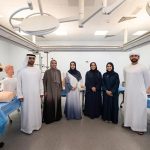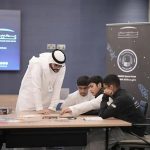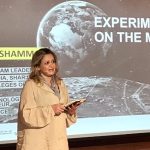Five entries from four UAE universities in the fields of physiology, psychology and biology are also part of the experiments.

Members of the Scientific International Research in Unique Terrestrial Station (SIRIUS) 20/21 spoke to the media and delegates during a live session held at the 72nd International Astronautical Congress on Friday.
The primary crew members included Oleg Blinov, Victoria Kirichenko and Ekaterina Krayakina from Russia, William Brown and Ashley Kowalski from the US and Abdalla AlHammadi from the UAE. The backup crew of Evgeny Prokopyev, Alexey Fedorov and Vera Bakhtereva from Russia, Brian Evarts and Tatiana Delani from the US and the UAEs Saleh AlAmeri were also present for the interaction. All the analog astronauts interacted through a live feed from the Institute for Biomedical Problems of the Russian Academy (IBMP) in Moscow.
Dr Sergey Ponomarev, executive director of the SIRIUS project from the Russian side along with Eng. Mohammad Bin Nashooq, UAE Analog Mission Project Manager briefed the gathering about the 240-day mission and wished the crew a successful mission. Emirati astronauts Hazzaa AlMansoori and Sultan AlNeyadi further wished the crew, speaking to them in English and Russian.
Yousuf Hamad AlShaibani, Director-General, MBRSC said: The UAE has over the past few years taken its first steps in the quest to explore planets beyond our own, as well as unveil possibilities that will benefit not just our nation, but the rest of the world and future generations to come. The SIRIUS analog mission continues our rich legacy of collaborative efforts and we will continue to partner projects that are critical for advancing our knowledge-based economy.
Adnan AlRais, Mars 2117 Programme Manager, MBRSC added: The analog mission is critical to ensuring the safety of astronauts and their well-being during long-duration spaceflights. Through the SIRIUS mission, we will be able to contribute to a better understanding of the science behind such missions, as well as obtain critical data that will aid us in tackling more ambitious space exploration projects, including the Mars 2117 Programme.
The details of the mission along with the scientific programme was also briefed by Eng. Shaikha Al Falasi, UAE Science Lead with Sirius 20/21. It was revealed that during the mission beginning on November 4, the crew would conduct a total of 70 experiments, that includes 29 psychological and psychophysiological investigations, 25 physiological investigations, six microbiological and sanitary investigations, five metabolism investigations, four immune investigations and one telemedicine investigation during the mission.
The UAEs participation in the SIRIUS mission will play a key role in developing Emirati capabilities and contribute to the development of the Mars 2117 Programme, which aims to establish human colonies on Mars by 2117. The Mars 2117 initiative is funded by the ICT fund of the Telecommunications and Digital Government Regulatory Authority.
















































































